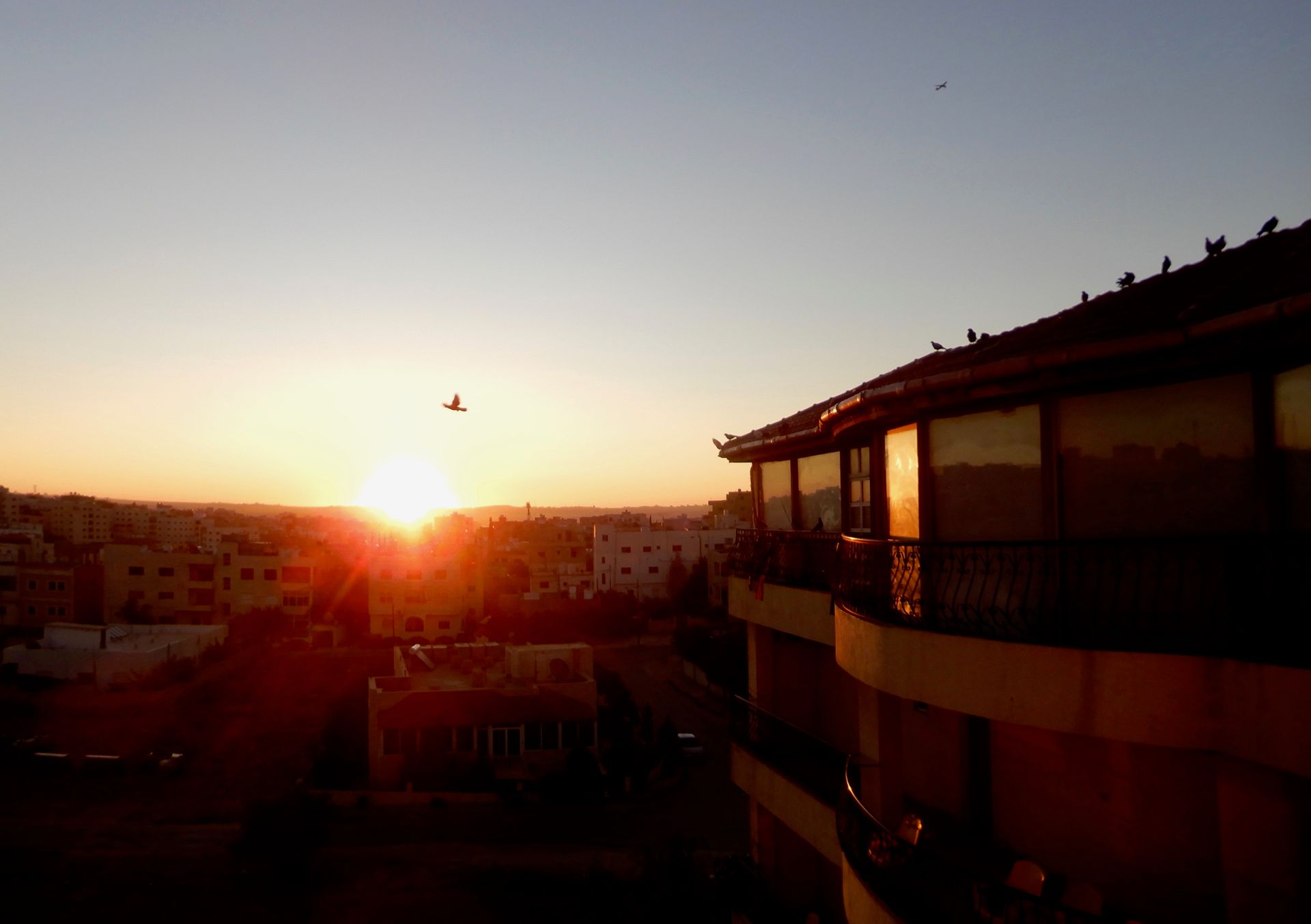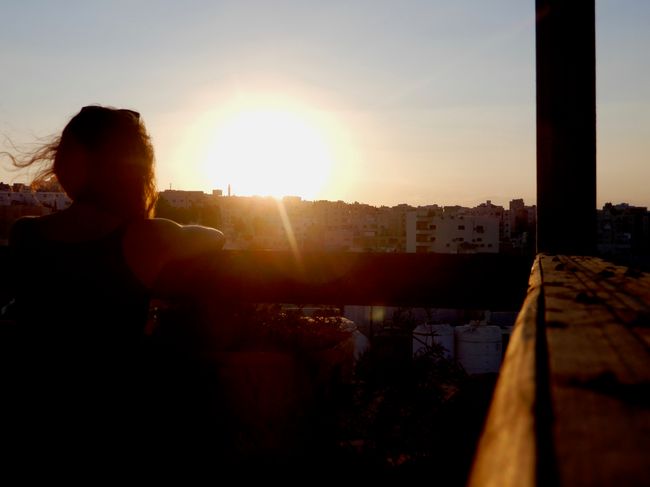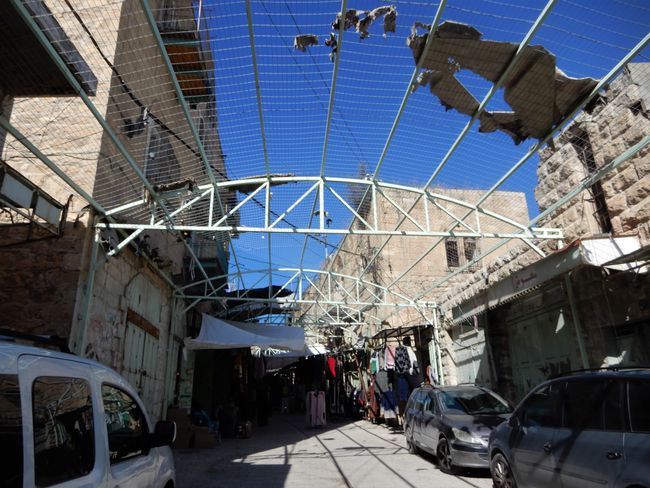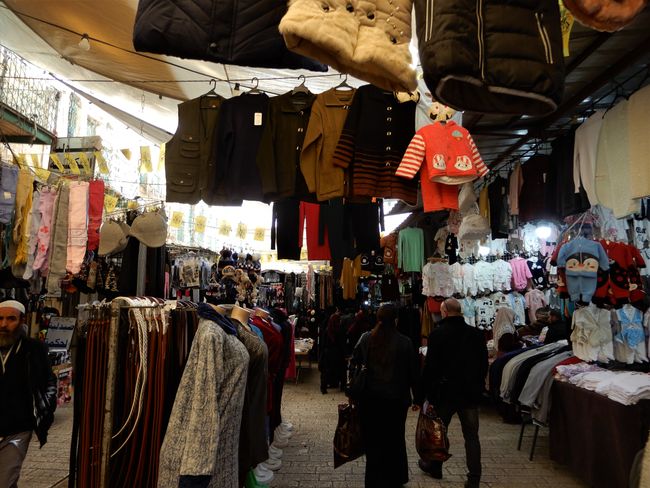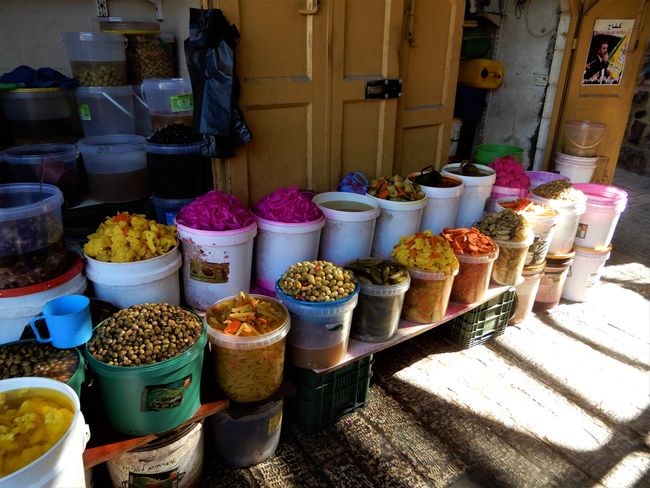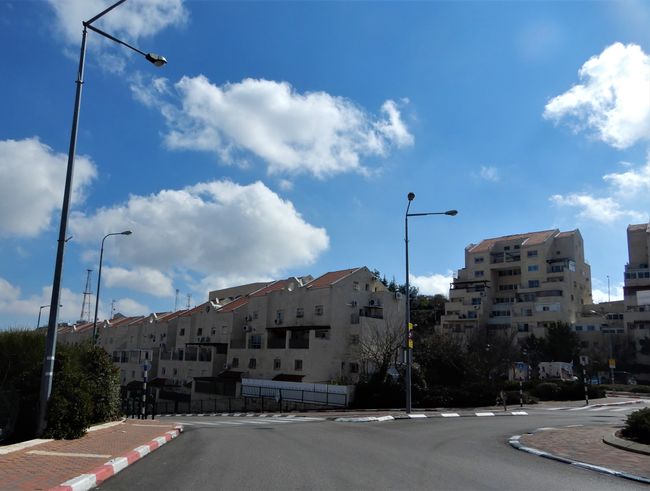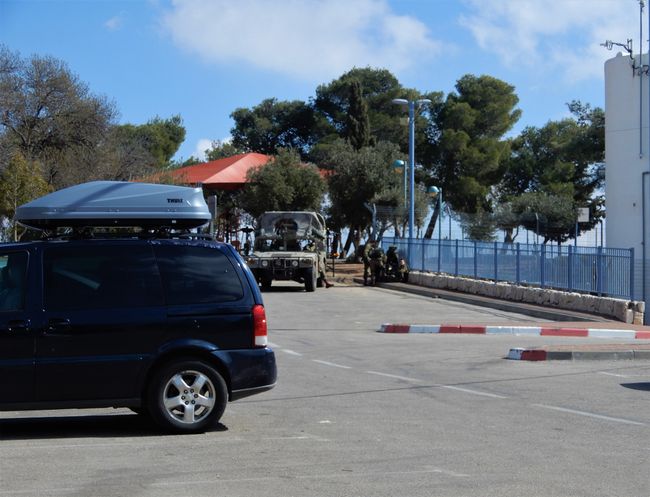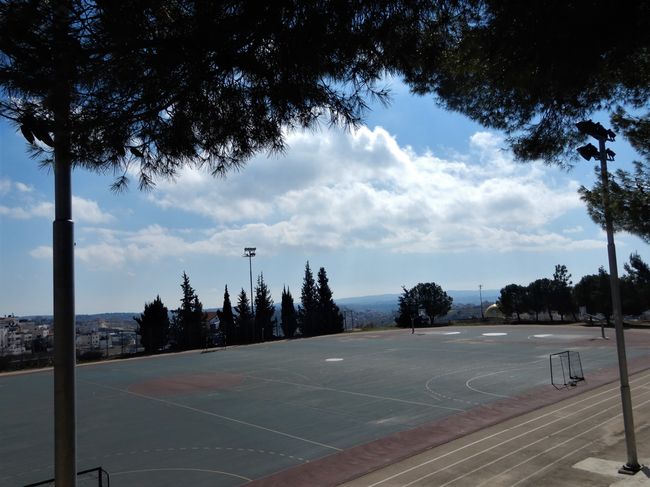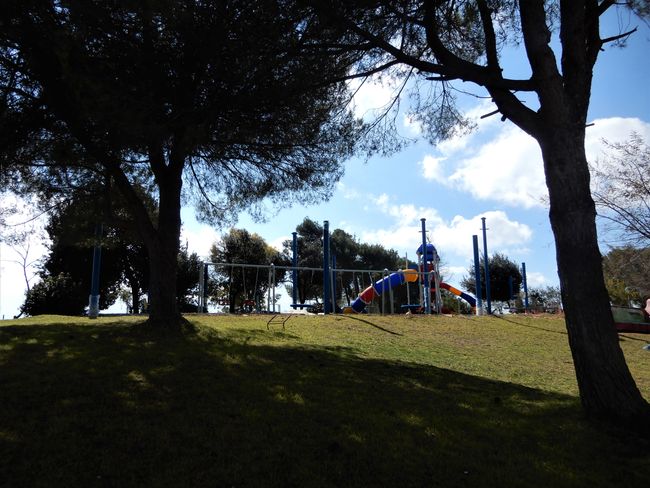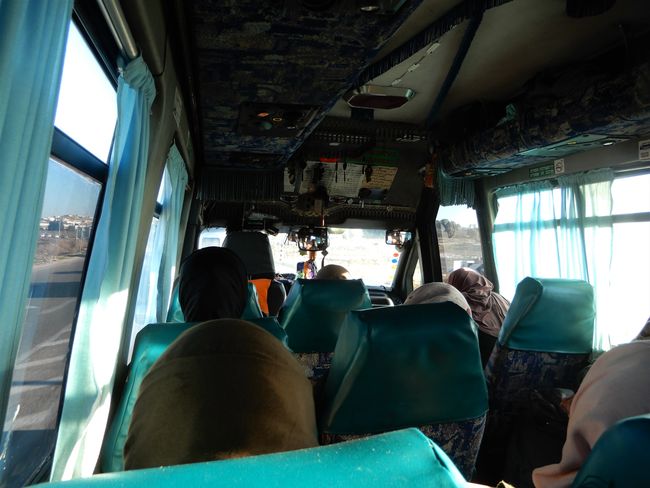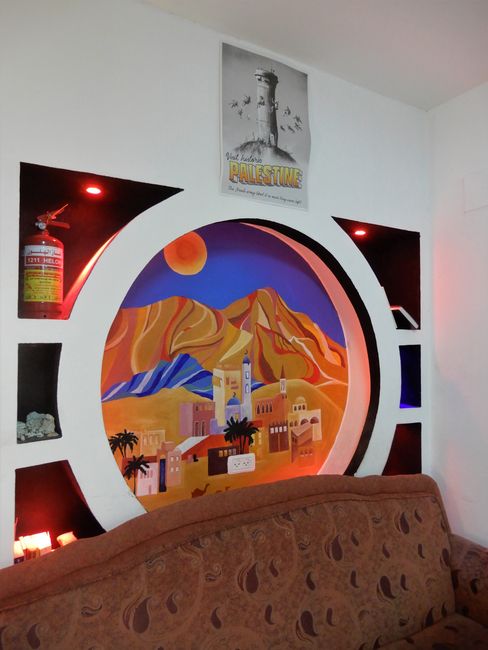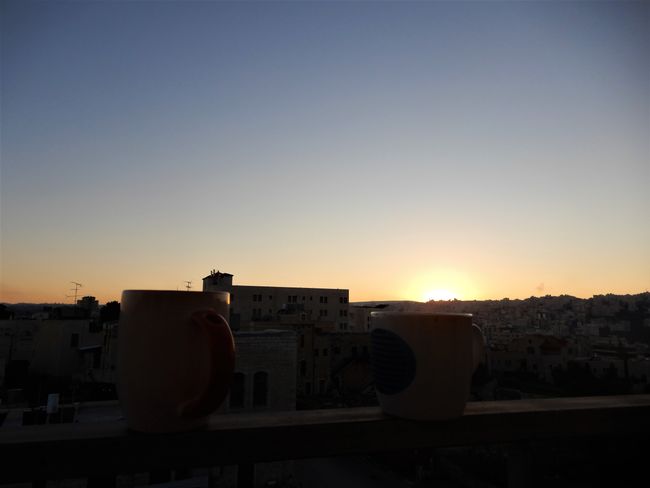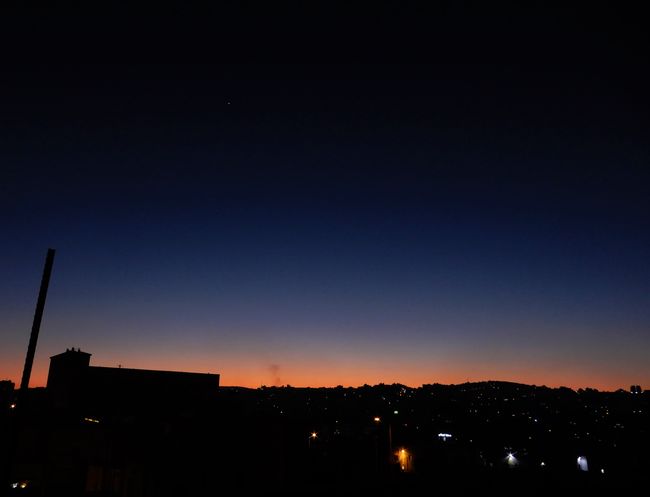In the crosshairs.
ಪ್ರಕಟಿಸಲಾಗಿದೆ: 07.02.2020
ಸುದ್ದಿಪತ್ರಕ್ಕೆ ಚಂದಾದಾರರಾಗಿ
Wednesday, February 5th
I really thought about whether I should publish this post. And I still don't know if it's a wise idea to write from Palestine at all. But I'm doing it anyway because I'm incredibly angry about what's going on here.
This morning we have our breakfast at the hostel so that we don't have to spend the morning in the city with empty stomachs again, and we set off on our pilgrimage. The weather is still wonderfully sunny, so we arrive in a good mood in the old town, where we want to stroll through the market again today. We both just love the atmospheric market alleys where you can find everything from clothes, food, fruit, and household goods. We just need to practice paying here in Palestine a little bit more. We are still not confident with the currency that we are not yet familiar with, and we definitely pay much more than we should.
Despite that, we are very satisfied with fresh bread and nuts and stop at a juice stand where we get a coffee. The very nice vendor even gives us a sweet pastry for free, which we gratefully eat while he shows us a picture of his brother. He tells us that his brother is studying in London and is "number one" there. He even has contact with the kings. In the picture he shows us, we see a young man standing next to wax figures of the royals. We only realize that we are disillusioning him when we inform him with the help of Google Translate that it is not the real royal family. He is visibly perplexed. He says he saw the photo on Facebook and simply assumed that his brother really visited the royal house. We do feel a little guilty being the ones to tell him the truth. But he will be fine.
We continue our way, today again to the revolving door in front of the Al-Ibrahimi Mosque. From the square in front of it, we want to take a bus to the Jewish settlement of Kiryat Arba, the largest settlement in Hebron. We had considered whether we should venture into a settlement for ethical and safety reasons, and we decided to do it anyway. If we want to get a complete picture of Hebron, the settlements are part of it. And we are curious about how people actually live there. Thalal and Dan (the Dutch volunteer in the hostel) have both told us that it's no problem. Dan has even been to the settlement and has spoken to some settlers. It wasn't easy, but very enlightening, he says.
So we set off to the bus stop that Thalal described to us. Past the Al-Ibrahimi Mosque and the soldiers, the same game as yesterday. "Where are you from? Germany? Are you Christian? Okay, enjoy!" I can't and don't want to get used to it.
So we wait in the sun for the bus and 15 minutes later we are on our way to the settlement. After just about 10 minutes of driving, our bus passes a checkpoint (of course, the entire settlement is fenced off with a wall and barbed wire), and then we are inside. The bus travels on wide streets lined with white, new buildings. We're not quite sure where exactly we want to go, and a few stops later we finally get off somewhere. So we start walking through the settlement.
Although the weather is beautiful today, we notice that there are hardly any people on the streets. Every now and then a few cars drive past us, but otherwise it seems that people here only appear in public when they need to go somewhere. Everything here seems clean (both in the figurative and literal sense - it's really incomparable to the trash that can be found everywhere in the city center of Hebron), anonymous, and somehow artificial. The green strip in the middle of the street is planted with neatly arranged palm trees, and the houses in the residential blocks are pristine. We try to find a city center using Google Maps to find some signs of life, and we come across a cultural center just a few meters away from us. We enter and find ourselves in an empty reception hall. In a room further back, we see through a glass wall that a few Jewish women are sitting at desks and apparently taking some course.
We look around. There are a few colorful pictures of children on the walls, as well as a kind of notice board with some flyers and documents pinned to it. However, everything is exclusively in Hebrew, so we don't understand a word. We turn in a circle. If anyone has seen us, they obviously don't care about us. Finding signs of life? Failed.
We step out of the building again and to the left of us is a kind of park that we now head towards. From a distance, we can already see a group of young soldiers standing and sitting around a military vehicle, chatting. They also don't seem to care as we walk past them. We take a walk through the small park, in the middle of which there is a colorful playground. There is only one Jewish mother sitting there with her little child. Otherwise, we are the only visitors here. The whole facility seems completely unused. Finding signs of life? Still nothing.
We make our way back and decide to at least have a coffee before leaving the settlement. It's also a good opportunity to maybe interact with some people, as Lea agrees. So we approach a young woman who is passing by and ask her if she knows a nice café. She is very shy and not really proficient in English, but she points us to a kind of shopping center where we have already looked in earlier. We saw the café there, but it didn't look cozy and it wasn't filled with people. We thank her and decide to give it one more try.
An older man with a long beard comes towards us with a stroller and stops at a bulletin board where he reads something. So we stand next to him and start talking to him. "Hello." No reaction. "Hello?" Still no reaction. Lea and I look at each other. "One question?" The man continues to read without responding. "Uh, one question?"
"Huh?" Finally, he turns to us. I shake my head inwardly. There is absolutely no way that he just noticed us now. Nevertheless, we still ask him about a café, to which he also refers us to the shopping center. We ask if there is something nicer, maybe somewhere else around here. "No, no, no! There's nothing else. But this is really nice." If this café is the nicest one in the settlement, I don't even want to see the other cafés. However, we have the feeling that he wants to prevent us from walking further through the settlement. So we thank him as well and then walk to the café in the shopping center. Apparently, we don't have any other alternative right now. Before we enter the café, we take a detour to the supermarket next to it. We get some strange, scrutinizing looks inside and then are once again treated as if we don't exist. In contrast to most Arab supermarkets we have seen, the supermarket itself is perfectly organized and offers alcohol, which is a really unusual sight. We get some nuts and pastries and line up at a checkout where the cashier simply states the price in Hebrew without greeting us. That's the only communication here.
Alright then. Last stop now, the café. It still doesn't look cozier than before. Some young men are sitting at one of the few plastic tables outside, smoking and drinking shisha. We order a coffee inside with a semi-friendly server who tells us that it's self-service when we try to sit down at a table. So we wait until she places the coffee on the counter and then we pay double the price for the coffee compared to the one we had in the old town this morning.
Outside at the table, we sit down next to the empty coffee cups left by the previous customers, unpack our pastries, and observe our surroundings. There are a few small shops here in the circular shopping center and a fitness center at the entrance - the only place where you see some people every now and then. Otherwise, also here, desolation. A child walks past us, briefly acknowledging us with just a glance, and then ignores us. Considering the attention we usually get from children here, it's really unusual. Even the children don't pay us any attention, Lea notices. It can be said that the attempt to find out more about the people here has failed.
We have a strong desire to be back in the city center, but we don't miss the opportunity for one last contact attempt at the table next to us. We ask the young men there if they know where the buses to the city leave from here. It takes a moment for one of them to respond while the others grin. "To where? Jerusalem?" I'm starting to wonder if people here even recognize the Arab-influenced city center of Hebron as a city. We say that we want to go to Hebron, to which he tells us the bus line. If we know when the buses leave, he asks. We say no. One could expect him to then tell us the times, but he doesn't know them either. So we ask about the location of the bus stop, to which he points in a not quite clear direction. Eventually, he agrees to walk a few meters with us across the courtyard of the shopping center until we can see the bus stop. However, we realize that he is not in the least interested in talking to us. Yes. The contact attempts here have indeed failed.
So we sit at the wall of the bus stop and eat some nuts, ready to leave this strange place behind. A larger car drives past us on the other side of the street and we notice that the driver doesn't stop staring at us. Considering our experiences from the past hour, this is really unusual. He now turns at the roundabout and drives towards us on our side of the street until he stops right in front of us. Lea and I look at each other. We have no idea what to expect now.
The driver gets out of the car and talks to a woman standing at the bus stop. We had passed her earlier. They look in our direction and it is quite obvious that they are talking about us. So he comes towards us now, holding his phone in one hand and a walkie-talkie in the other. He wants to know where we come from. It's the first time that saying "Germany" doesn't satisfy anyone here. He asks where we are coming from at the moment. From the city, we truthfully answer. What we are doing here, the next question, which sounds hostile. We tell him that we just want to look around the area, to which he waves his phone. He has some photos of us from yesterday, showing that we were involved in "problems with the Arabs." We realize how the conversation, which was uncomfortable from the beginning, is taking a critical turn. We deny what he says, which doesn't satisfy him. He wants to know what we did on the Palestinian side. We keep repeating the same thing, like a broken record - we just want to look around the area.
It's obvious that he doesn't believe a word we say. He goes back to his car and radios a few people with his walkie-talkie. Lea and I have a really uneasy feeling. We don't know who this man is - Israeli intelligence, security officer, military, police. It could be anything. And any of those options can be really uncomfortable. We wonder why exactly we ended up in this settlement. But now there's nothing we can do to change it, even if we wish we could.
The man finishes his walkie-talkie conversations and comes towards us again. He asks us if we're sure that we weren't involved in anything. I'm really getting annoyed and ask him if he can show us the pictures of us if he indeed has any of us. Standing right in front of us, he takes out his phone and announces that he will now take pictures of us. While Lea hides her face behind her hands, I'm too perplexed and too angry to do the same. Why, we ask him. Why not, he replies. If we have anything to hide. I start to boil inside and tell him that no one else just takes pictures of us without asking. He keeps repeating if we have anything to hide, then gets back in his car and drives off.
We don't know what happens now. We just know that we want to get out of here. It's possible that we're imagining things, but now military vehicles are driving past us in shorter and shorter intervals. And there's that man again, who now has a picture of me on his phone. We ask a bus driver who stops at our bus stop about the bus line that goes back to Hebron, but he either doesn't know or doesn't want to give us any useful information. We stand at the bus stop for a while, but eventually we can't stand the tense situation and the military presence anymore. We decide to walk back to the city center.
The way out of the settlement leads us through an obviously Palestinian residential area. Suddenly, we are noticed again. Two young women who pass us greet us and giggle. Children run towards us and shake our hands. Even though Lea reminds me that it would be better not to have too much contact with people in Palestinian territory, especially with all the cameras attached to every corner here in Hebron - it feels good to be back in the area.
We come out behind the Al-Ibrahimi Mosque and have to pass another checkpoint there. The Israeli soldier asks if we are Christians and answers the question himself with a look at the small golden cross hanging around my neck. Without waiting for an answer from us, he opens the gate. I feel like throwing up.
We take the shortest route through the old town up to our hostel when we notice a young man walking in front of us, talking on the phone in English. The word "activist" comes up. We become alert. "They are here now." Lea and I look at each other. We turn into the next street and after a few meters, we notice that the man is now walking behind us. We slow down our pace, let him pass us, and now we are behind him again. He takes the path towards the hostel. We imagine all kinds of things, but then he gets into a taxi a few meters in front of our hostel and drives away. Maybe it's all just a coincidence, but our heads are no longer able to distinguish between figments of the imagination and reality. We are just relieved when we arrive at the reception of the hostel.
Where we sit alone. No one seems to be here. While we delete all the conversations on our phones that involved Israel and Palestine, Lea contacts a friend whose mother is from Israel to hear his assessment of our situation. Then a shot is fired. We look at each other. Just last night, we heard fireworks, but the sound now was different. There is absolute silence for a while. Then another shot is fired. And another one. And another one. We wonder where everyone else from our hostel is. And if anyone can wake us up from this nightmare.
Lea goes to the toilet and I hear her coming back down the stairs shortly after. However, it is not Lea who enters, but one of the receptionists. I want to hug her so badly, I'm just so glad to see her. Even more so because she is beaming, and obviously everything is fine with her. The second receptionist joins us, and everything seems to be fine with her as well. I ask them if they heard the shots earlier. At first, they don't know what I mean, but then they wave it off. They say that they hear that regularly here. It's the sound of tear gas canisters that soldiers fire when children throw stones at them. They are not worried in the least. I feel a weight lifting off my shoulders.
Dan, the volunteer (who, by the way, studied international law) and Lea arrive shortly after, and we tell everyone what happened to us in the settlement. Dan furrows his eyebrows. That has never happened to him here, he says. But he is sure that nothing can happen to us - we haven't done anything wrong. Then Lea's contact in Israel gives us the all clear: the mother of the friend she contacted knows the man who harassed us in the settlement. Lea took a picture of him. He is not an official, but an extremely radical settler who is obsessed with protecting "his" settlement and scaring off any intruders from outside. It's difficult to put into words how relieved we are. It's crazy how quickly you can create scenarios in your mind, but we had already seen ourselves on the Israeli secret service's red list. And as for the radical settler: the amount of audacity and ruthlessness he possesses is truly on another level.
Nevertheless, we are glad to move on today and now make our way to Bethlehem. We get on a local bus after the extremely friendly bus driver loaded our luggage, and enjoy the ride with people who make us feel comfortable. Upon arriving in Bethlehem, we reach our hostel after a short walk, where the hostel owner offers us a coffee and we can relax on the balcony at sunset. What a day.
ಸುದ್ದಿಪತ್ರಕ್ಕೆ ಚಂದಾದಾರರಾಗಿ
ಉತ್ತರ
